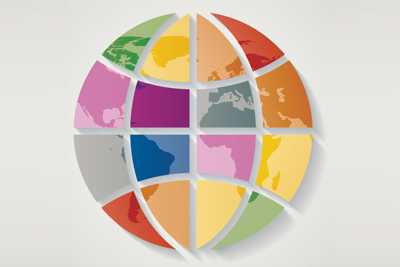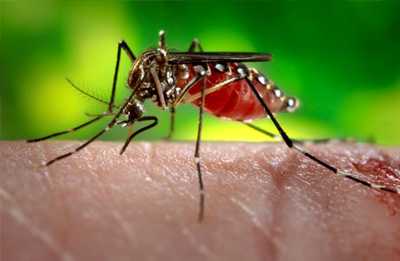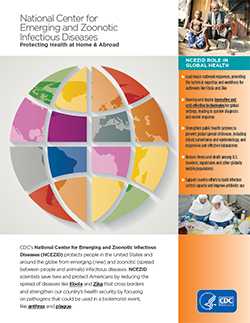Protecting Health at Home & Abroad

CDC’s National Center for Emerging and Zoonotic Infectious Diseases (NCEZID) protects people in the United States and around the globe from emerging (new) and zoonotic (spread between people and animals) infectious diseases. NCEZID scientists save lives and protect Americans by reducing the spread of diseases like Ebola and Zika that cross borders and strengthen our country’s health security by focusing on pathogens that could be used in a bioterrorist event, like anthrax and plague.
Preparing for the Next Outbreak: NCEZID’s Role
Today, disease threats spread faster and more unpredictably than ever before. NCEZID experts are focused on preparing the U.S. and our global partners to respond to a range of potential threats.
Combatting Global Antimicrobial Resistance
High levels of antimicrobial resistance (AMR) have been found in all regions of the world, threatening our ability to treat common infections. NCEZID is joining forces with world leaders, non-governmental organizations, private industry, and public health organizations to develop solutions to combat this urgent and growing threat.
In 2016, CDC and NCEZID leadership met with world leaders at the United Nations General Assembly to reinforce the importance of global action to fight AMR and the threat it poses to development goals and modern medicine.
NCEZID is working with federal and international partners to increase 1) information exchange, 2) understanding of best approaches for use of antimicrobial drugs, and 3) prevention of healthcare and community associated drug-resistant infections.
NCEZID is also working to expand public health laboratory capacity to 15 partner countries to identify priority pathogens with antimicrobial resistance and report results to international surveillance networks.
Developing New and Better Technologies
Protecting Americans and people around the world demands that we develop and deploy better diagnostics, vaccines, and innovative prevention solutions. Scientists responding to outbreaks abroad need faster and more accurate technologies, like those that use whole genome sequencing. The growing threat of vector-borne disease demands that we have tests that can distinguish between diseases with similar symptoms (like Zika, dengue, and chikungunya), but that require different treatments.
Prioritizing Zoonotic Diseases
A One Health approach promotes multi-disciplinary collaboration across human, animal, and environmental health sectors to achieve optimal health outcomes for both people and animals. As an example, CDC’s One Health experts are working to globally implement a One Health Zoonotic Disease Prioritization process so that limited resources can be focused on those zoonotic diseases of greatest national concern. CDC scientists will assist these countries to develop effective control and prevention strategies to mitigate their greatest zoonotic disease threats.
NCEZID ROLE IN GLOBAL HEALTH
- Lead major outbreak responses, providing the technical expertise and workforce for outbreaks like Ebola and Zika
- Develop and deploy innovative and cost-effective technologies for global settings, leading to quicker diagnosis and earlier response
- Strengthen public health systems to prevent global spread of disease, including robust surveillance and epidemiology, and
responsive and effective laboratories - Reduce illness and death among U.S. travelers, expatriates and other globally mobile populations
- Support country efforts to build infection control capacity and improve antibiotic use

IMPROVING THE U.S. RESPONSE TO VECTORBORNE DISEASE
Recent outbreaks of Zika, chikungunya, and dengue highlight the increasing threat of vector-borne disease to the U.S. and its territories from other parts of the world. CDC is at the forefront of developing a coordinated strategy to increase our understanding of these diseases, advance tools to combat vector-borne diseases, and help states prevent, detect, and respond to vector-borne threats.
- Page last reviewed: July 20, 2017
- Page last updated: July 20, 2017
- Content source:
Centers for Disease Control and Prevention
National Center for Emerging and Zoonotic Infectious Diseases (NCEZID)


 ShareCompartir
ShareCompartir
